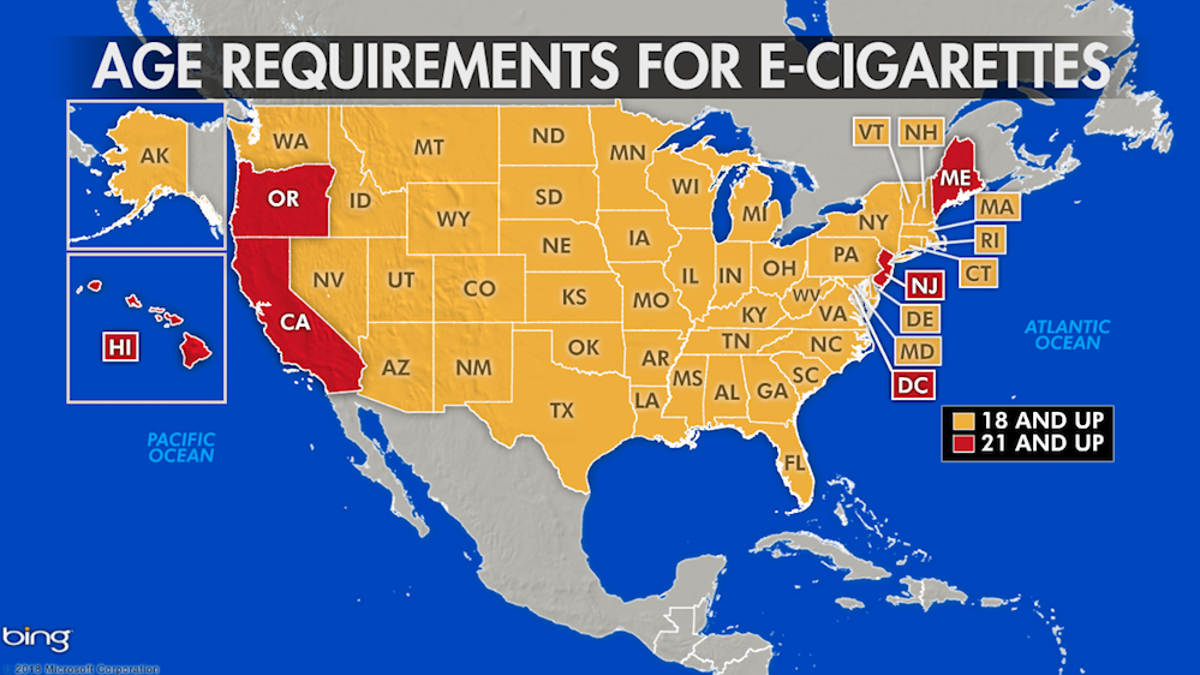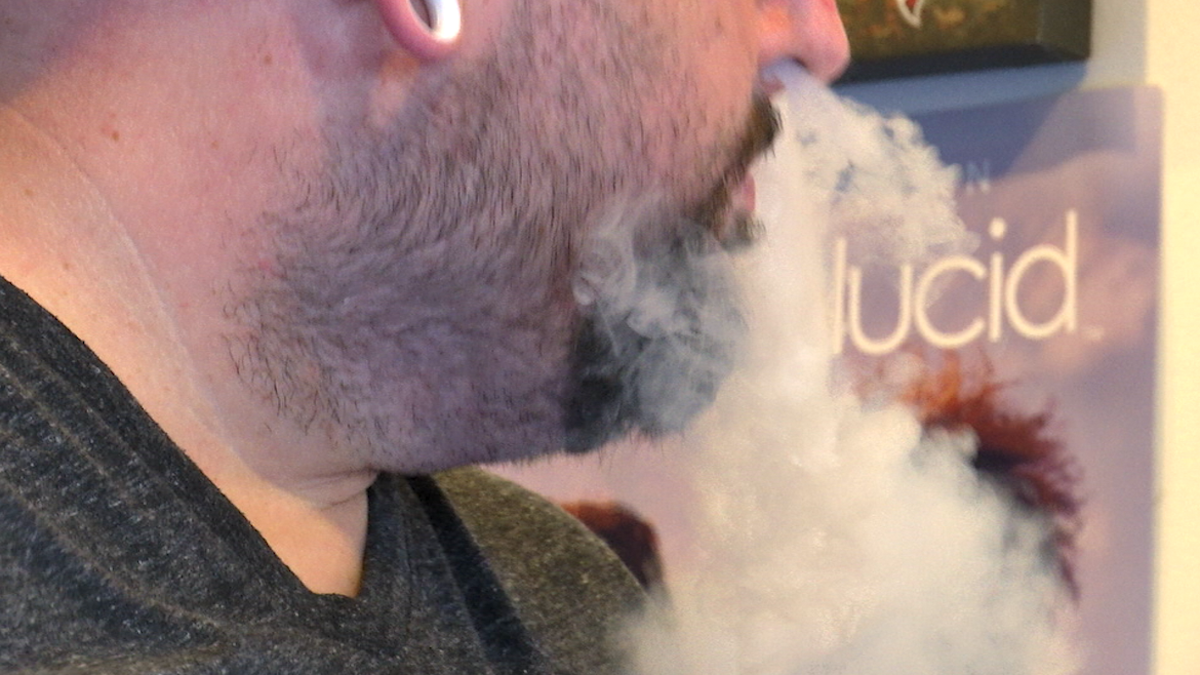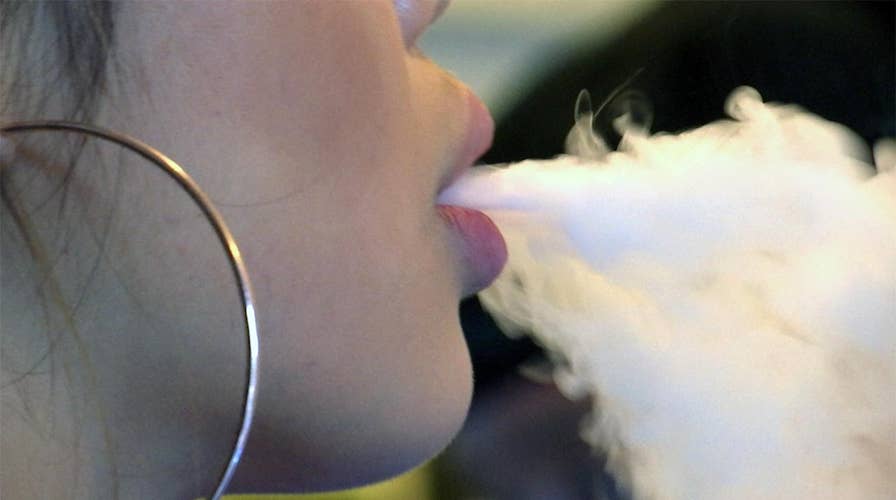E-cigs remain popular among youth
Despite continued national and local efforts, progress in minors' e-cigarette use has stalled.
ATLANTA – Despite national and local efforts to reduce minors' e-cigarette use, kids just aren't listening.
According to a Centers for Disease Control and Prevention (CDC) study released on Thursday, more than 2 million teens commonly used e-cigarettes in 2017, with one expert noting that the number is likely higher.
Dr. Brian King, of the CDC's Office on Smoking and Health, told Fox News that many teens now describe vaping as "JUULing," due to a rise in popularity of new JUUL products, meaning "it's possible we have underestimated the extent of e-cigarette use in this survey."
Overall, youth usage of any tobacco product has substantially declined, thanks to successful ad campaigns and school programs, which saw the numbers drop from 4.5 million users in 2011 to 3.6 million in 2017.
But according to King, the advertising and availability of e-cigarettes and vaping products have halted the progress they were making.
"You won't find a kid in Georgia who hasn't vaped before," Drake Jennings, a Georgia high school student, told Fox News.
A new study from Georgia State University supported that theory, citing the surging sales of JUUL and calling it the most popular e-cigarette brand in the U.S.
Anna Belle Wallace, one of Jennings' classmates, said she remembers the burst of flavor when she first tried an e-cigarette.
“Cotton candy,” Wallace said. "It’s tasty, but the nicotine part you can taste.”
E-cigarettes administer a puff of flavored aerosol that can contain nicotine, cancer-causing chemicals and heavy metals.
Users can pick from a seemingly endless selection of juice flavors, ranging from cotton candy to skittles and mango. Devices come in all shapes and sizes – some discrete enough to hide in the palm of your hand.
“You’d be surprised at who [uses e-cigarettes],” Bryce Wethington, another high school student in Georgia, said. “Like, you could see it being passed around the classroom."
But the long-term effects of the fairly new product – introduced just over a decade ago according to the Consumer Advocates for Smoke Free Alternatives Association – are largely unknown. Nicotine is highly addictive and can harm the adolescent’s developing brain, according to the CDC.
“When it comes to youth, we don’t want [them] to choose between an e-cigarette and a cigarette,” King said. "Any tobacco product use among youth is unsafe."
King admitted the aerosol emitted in an e-cigarette has a lower level of toxins and dangerous ingredients than conventional cigarette smoke, but pointed to the U.S. Surgeon General’s conclusion in 2016 that aerosol is not harmless.
That same year, the FDA qualified e-cigarettes under tobacco products, thus prohibiting the sale of the devices to anyone under 18. Five states and Washington, D.C. upped the ante and won’t sell e-cigarettes to anyone under 21.
Since then, communities across the country have implemented stricter regulations of vaping products, including Cumming, Ga., Jennings, Wethington and Wallace’s hometown.

Five states and Washington, D.C. prohibit the sale of e-cigarettes to anyone under 21 years old, according to the CDC. (Fox News)
The city’s mayor, Troy Brumbalow, said the “tipping point” for him was a series of vaping incidents that required medical intervention for underage students in Forsyth County.
The ordinance, adopted in May, mirrored county guidelines, which allow for store and product inspections.
Forsyth County District 4 Commissioner, Cindy Mills, is angered by the way “these money-hungry e-cigarette folks” are marketing their products.
“I mean it’s no coincidence what the names on the products are,” Mills told Fox News.
Jennings noticed e-cigarette use pick up at North Forsyth High last year, with many of his peers particularly drawn to JUULs – a USB look-a-like that markets itself “unlike any E-Cigarette or Vape.”
The product’s popularity set off a string of actions taken by the Food and Drug Administration this spring.
The FDA has required numerous companies, including JUUL Labs, to submit “important documents” on their products. It also sought public input on the influence of flavors, launched a nation-wide blitz on both online retailers and brick-and-mortar shops selling to minors and warned more than one dozen companies who “are marketing products in ways that are misleading to kids.”
In a statement to Fox News, JUUL Labs said they “cannot be more emphatic on this point: No young person or non-nicotine user should ever try JUUL,” adding that they pledged $30 million for independent research, youth and parent education and community engagement.
One e-cig trade group supports the FDA’s crackdown on companies targeting young people, but says that shouldn’t overshadow the positive influence vaping can have on tobacco smokers trying to quit.
“If e-cigarettes were removed from the market today, you’re going to find the largest segment of the current vapor user go back to conventional tobacco,” said Ray Story, CEO of Tobacco Vapor Electronic Cigarette Association. “That would have a monstrous impact.”

The general manager of Vape 911 in Atlanta vapes while describing different products to customers in the store. (Fox News)
Story said there should be greater accessibility to e-cigarettes over conventional cigarettes for adults and more resources devoted to enforcing the age requirement.
In a statement released this week, FDA Commissioner Scott Gottlieb acknowledged “e-cigarettes may present an important opportunity for adult smokers to transition off combustible tobacco products.”
“But these public health opportunities are put at risk if all we do is hook another generation of kids on nicotine and tobacco products through alternatives like e-cigarettes,” he added.
Jennings, Wethington and Wallace said while they recognize the dangers of using e-cigarettes at a young age and never made a habit of it, the FDA’s warnings aren’t getting through to most of their peers.
“I don’t think there is any concern at all [about what’s in the juices],” Wethington said. “I think they’re wanting to pay the consequences later,” Jennings chimed in.

